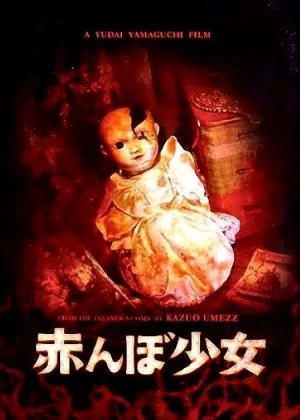Akanbo Shojo
After his fierce entry into the world of cinema, the buzz around Yamaguchi has subsided a little. His latest offerings have been less in your face compared to his earlier films, but that doesn't make them any less interesting. His latest film is again firmly rooted in horror ground, but rather than mix it up with gore, splatter and comedy, Yamaguchi takes a more serious approach this time. At least, more serious for his doing.

Yamaguchi made a name for himself by mixing goofy gore with manga-esque escapades and plain utter weirdness. His boldest outing to date is Meatball Machine, an aptly titled film that finds itself somewhere between the likes of Tetsuo and Tokyo Gore Police. But Yamaguchi worked himself up to become more than simply a cult figure, proving himself worthy enough to take part in the Yume Ju-Ya anthology. In between he got involved in a Kazuo Umezu project, of which Tamami became a logical extension. Umezu is considered the godfather of the horror manga and his style of horror is pretty recognizable, in the same way that you can spot a Rampo story from half a mile off. More subdued than Yamaguchi's typical style, but the mix of both artists proved to be a strong one.
Tamami starts off slow, cold and detached. After an absence of 15 years, Yoko returns to her fatherly home. At one point considered lost, she is traced down by her father to the orphanage she currently resides and is asked to rejoin her parents in their mansion. When she finally reaches her old home, she is greeted by an old house maid who is less than willing to report her arrival to her father. Her mother is equally occupied with seemingly more important chores and Yoko is left to herself in the huge building. Of course, it doesn't take too long before things get weird, such is the fate of any haunted house introduction.

For those expecting a true Yamaguchi film, the start might come as quite a shock. There is none of his usual trickery. No vigorous camera work, no stupendous characters, not even the slightest hint of gore. The camera work is controlled and precise, the styling, though very present, extremely cold and lifeless. Yamaguchi eases his camera through the settings, slipping in an odd camera angle from time to time, but keeping his foot firmly on the breaks. The setting is atmospheric though somewhat artificial, all characters seem to be machine operated (the house maid in particular). All of this combined gives Tamami a flavor that is not too different from films like The Others. The only little hair in the proverbial butter is Yoko herself, who is not really up to standards with the rest of the film, coming off as quite fickle and screamy.
Yamaguchi takes his time introducing the story and setting, and keeps information sparse for the first half. After the halfway point he switches gears and brings Tamami to the stage. His shift in style is remarkable and with the introduction of Tamami the Umezo influence instantly becomes apparent. Still not as manic and energetic as his usual work (though there's that scene where Tamami races through the ducts) but the weird horror streak brings a welcome diversion to the frozen world of the first half. Tamami himself is a weird creature, part monster, part baby, part dramatic character. He runs through the film as some sort of tragic Gremlin being, sometimes playing the victim, at other times having fun ripping people apart. And at one point even displaying some ninja capabilities, just so you know there's still some Yamaguchi left in the film.

Tamami is a rather uneven film, with a great shift in style between the first and second half of the film. The story too floats around a little too much and if suspension of disbelief is a big point in your book of important cinema aspects, Tamami might not be a good film for you. But if you like Umezo's work and are in for some horror fun, bearing some typical Japanese twists, Tamami is a fun ride. It sports a cool main character, some nice camera work and very atmospheric and detailed styling. The first half sets a good mood, which is then meticulously destroyed in the second half in favor of good fun and pleasant horror antics. On paper this sounds like a rather unlikely combination for a good film, but Yamaguchi makes it works and delivers yet again a good tale of horror.
It's a bit hard to recommend this film as it is rooted in a segment of Japanese horror that is not too known here in the West, but if you are familiar with any of the names here, or are just tired of the next Ring/Grudge rip-off, this might be a nice diversion.
